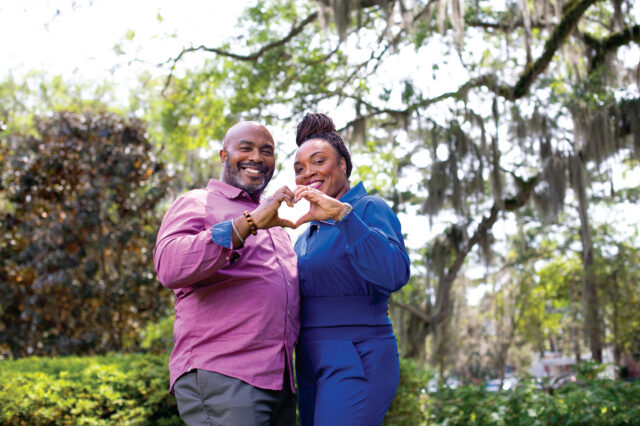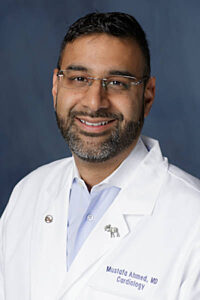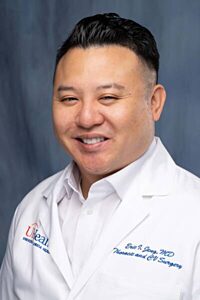UF Health heart failure doctors are known for their “First in Florida” achievements – from performing the state’s first heart transplant to delivering the world’s first-of-its-kind stem cell therapy to regenerate heart function. Our experts lead the way in heart failure care.
Why choose UF Health?
With decades of experience in heart failure therapies, UF Health’s board-certified, nationally recognized heart failure doctors and surgeons are on the leading edge of developing life-saving therapies and treatments enabling patients to enjoy restored quality of life and mobility. UF Health is recognized as a high-performing heart failure hospital by U.S. News & World Report, and our program is designated as a Blue Distinction Center of Excellence by Florida Blue.
We offer a patient-focused, collaborative team approach designed to help those struggling with heart failure feel better and live longer. UF Health’s heart failure team of cardiologists, cardiac surgeons and clinical coordinators work together to provide comprehensive, compassionate care and innovative, leading-edge therapies to patients suffering from advanced heart failure. Patients can expect to receive expert management of their heart failure, whether it’s through medical management, mechanical circulatory support – such as a ventricular assist device – or heart transplantation.
In addition to caring for patients with advanced heart failure, our team provides subspecialized for rarer forms of heart failure, including Hypertropic Cardiomyopathy, Infiltrative (amyloid) Cardiomyopathy and CardioOncology.
Advanced heart failure treatments
Heart failure occurs when the heart is unable to pump enough blood to meet the body’s needs. There may be a number of causes for this serious condition, and treatment depends on the type and stage of the disease. UF Health cardiologists and cardiac surgeons offer the full range of services for heart failure patients, including:
LVAD devices are sometimes called a “bridge to transplant.” People awaiting heart transplant often must wait longer than their extreme illness allows before a suitable heart becomes available. During this wait, the patient’s already-weakened heart may deteriorate and become unable to pump enough blood to sustain life. An LVAD can support the patient until a heart becomes available.
LVAD technology has advanced over the years and are also now approved for use as destination therapy, meaning a person who is not a candidate for a transplant can use the mechanical device to maintain heart function. We currently implant several types of LVADs, each with its own specific clinical indication. As this technology continues to evolve, mechanical support systems will become a standard for patients who otherwise would not be able to receive heart transplants.
We take great pride in our LVAD program for heart failure patients. Our program is designated a Blue Distinction Center of Excellence by Florida Blue and is also a Joint Commission Disease Specific certified LVAD center. The outcomes for patients who receive LVAD implants at UF Health are among the best in the nation.*
*UF Health’s one-year survival rate for LVAD patients following implant is 91%, compared to 82% for the Interagency Registry for Mechanically Assisted Circulatory Supports, or INTERMACS, and post-surgical complications – such as bleeding and infection – are significantly lower than the INTERMACS averages.
Medical management
Heart failure generally responds best to treatment and control when diagnosed early. Medicines can be prescribed to control disease progression and help the heart function more effectively. These include blood thinners, drugs to lower cholesterol and control hypertension, and other medicines that reduce the pressure on the heart so that it can function under less duress. Lifestyle changes – such as eating healthy foods, exercising more, not smoking, and limiting alcohol consumption – also make a significant impact on improving and controlling early-stage heart failure.
Some heart failure patients may benefit from cardiac resynchronization therapy, or CRT, using an implanted pacemaker to help the heart beat more effectively. In heart failure, the lower chambers of the heart, called ventricles, don’t contract enough to eject blood and sometimes they beat out of sync with each other. The pacemaker delivers a small electrical pulse that helps the heart ventricles beat more effectively and in synchrony, and can lead to improvements in the heart muscle health and reduction of other risks due to heart failure, like stroke.
Stem cell therapy
UF Health is on the forefront of stem cell therapy research, and offers patients who meet certain criteria the opportunity to participate a clinical trial that combines both heart and bone marrow stem cells. This is the first study of its kind in the world. The cardiac stem cells are expected to regenerate heart muscle, while the bone marrow mesenchymal stem cells have the ability to generate blood vessels and supportive tissue for heart cells. The ultimate goal is to learn if we can restore heart function to keep patients out of the hospital.
UF Health cardiac surgeons have significant experience and expertise in the surgical management of heart failure. This can include surgical restoration of the heart’s ventricular geometry to increase its pumping efficiency. We are also involved in the pioneering work of developing several devices to reduce the dilation of the failing heart. Heart transplant becomes an option when all other available medical and surgical options have failed to prevent end-stage heart failure. UF Health was the first in Florida to perform heart transplants in both adults and children, and our physicians have a long track record of “firsts” that have paved the way for improved patient outcomes. UF Health transplant surgeons and their teams have performed thousands of heart transplants, and UF Health is a major regional transplant center, meaning that the expertise and technologies in place at UF Health for heart transplant are well established and the most advanced available.









